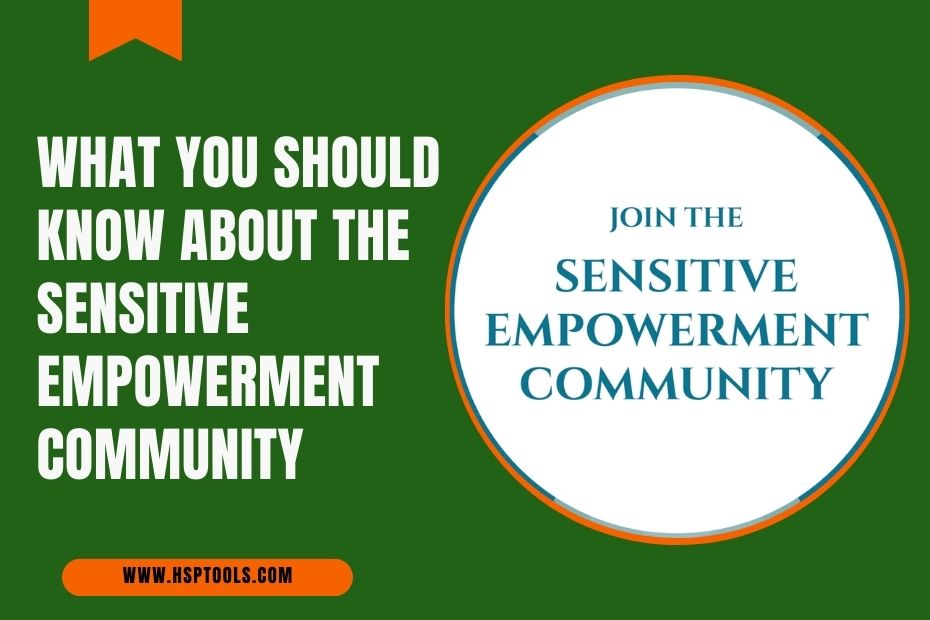How to Navigate Sensory Overload as a Highly Sensitive Person (A Beginner’s Guide)

Sensory Overload is one of the top struggles among Highly Sensitive People (HSPs). It happens when our senses take in more information than the brain can handle.
In today’s post, I dive deep into the relationship between Sensory Overload and being Highly Sensitive and answer a few questions you might be asking.
And because I’m no expert, I’ll share what I learned from this free masterclass on Sensory Overload and the Highly Sensitive Person.
Julie Bjelland, a Psychotherapist specializing in High Sensitivity, teaches the class and shares helpful resources to help reduce Sensory Overload.
Let’s dive in.

What is Sensory Overload?
Sensory Overload is an overwhelming experience caused by excessive sensory input.
It occurs when our senses – sight, sound, touch, taste, and smell, are bombarded with stimuli beyond our brain’s processing capacity.
This flood of information can leave individuals feeling anxious, stressed, and physically exhausted.
What Causes Sensory Overload?
Sensory Overload happens when our senses are overloaded with too much input and is often triggered by what we hear, smell, see, touch, and taste.
Below is a list of six common triggers of Sensory Overload to help you understand this phenomenon better.
- Noise – Loud noises, such as traffic, construction, or crowded places, can overwhelm HSPs. The constant barrage of sound can cause anxiety and make it challenging to focus and concentrate.
- Bright Lights – Bright lights, especially fluorescent or flickering, can be visually disturbing for HSPs. These lights can cause eye strain, headaches, and even migraines, making it difficult for HSPs to stay in such environments for extended periods.
- Strong Smells – HSPs often have a heightened sense of smell, which means strong odours can be overwhelming. Perfumes, cleaning products, or certain foods can trigger headaches, nausea, and discomfort for HSPs.
- Coarse Fabric & Clothing Tags – Some fabrics can cause irritation on a Highly Sensitive Person’s skin. And the same is true for clothing tags. Many HSPs will often cut out tags and be selective with their clothes to avoid this discomfort.
- Strong Tastes – Just as strong smells are overwhelming for HSPs, strong tastes can trigger Sensory Overload. This is true for food and drinks. An example would be spicy food, alcohol, caffeine, sugary drinks, etc.
- Crowded Spaces – Being in spaces with many people can be distressing for Highly Sensitive individuals. The constant proximity to others, the noise, and the lack of personal space can quickly feel overwhelming.
How Does Sensory Overload Affect Highly Sensitive People?
Sensory Overload affects Highly Sensitive People (HSPs) differently. So, examine your experiences and identify how it affects you individually.
But generally speaking, below is a list of physical, emotional, and psychological issues you can expect from Sensory Overload.
- Anxiety
- Stress
- Irritability
- Fatigue
- Difficulty concentrating
- Headaches
- Sleep issues (Insomnia or sleeping too much)
- Burnout
- Low productivity, creativity & focus
- Strong emotional reactions
- Physical pain
Knowing how Sensory Overload affects you personally is crucial to finding the right solution. This free masterclass by Julie Bjelland will guide you through the process.
Why Do HSPs Struggle with Sensory Overload?
Now that you understand what Sensory Overload is, what causes it, and how it affects you as an HSP, let’s look at why it’s such a struggle for HSPs everywhere.
You see, HSPs are individuals with a heightened sensitivity to external stimuli.
They have a sensitive nervous system that makes them more perceptive to environmental changes, which leads to greater emotional and physical responses to daily experiences.
They also process information deeply, and everyday situations that might be tolerable for others can become overwhelming.
So, while many people can filter out unnecessary information and avoid Sensory Overload, HSPs are wired to take it all in – without a buffer.
Also, in addition to this inner wiring, Julie Bjelland says that HSPs often face the following challenges:
- Living in a world not set up for HSPs – Highly Sensitive People are 20-30% of the population. So, it’s expected that the world isn’t structured for them. This is challenging for many HSPs as they struggle to fit in with others.
- Busy schedules and societal expectations – While daily plans and expectations for school, work, home, and society can seem normal to many people, it’s a struggle for HSPs.
- Wrong Messaging – Many HSPs grow up feeling like there’s something wrong with them. Because being sensitive is seen as a weakness by most cultures. This messaging only makes the HSP experience worse.
- An overwhelmed nervous system – If you take in too much information from your environment, you will be constantly overwhelmed. And being overwhelmed will always result in Sensory Overload.
- Lack of education – Before Julie Bjelland learned she was Highly Sensitive, she struggled with depression, anxiety, stress, and overwhelming emotions. And this is true for many HSPs. Sensory Overload and the HSP trait are not taught in school. You have to intentionally learn about it to understand why it happens and how to overcome it. Take this free class to educate yourself.
- Inability to push through – Have you ever been told to toughen up? Maybe because you often cry about things that don’t seem to bother others? If yes, you’re not alone. Having the HSP trait means you react strongly to external and internal stimuli. And unless you learn how to calm your sensitive nervous system, you can’t push through problems as fast as most people can.
These challenges, coupled with the inner wiring of the HSP trait, are why you struggle with Sensory Overload as a Highly Sensitive Person.
Learn more about this when you take Julie’s free class.
How to Prevent Sensory Overload (8 Tips from an HSP Psychotherapist)
All things considered, can you prevent Sensory Overload?
Looking at the common triggers and challenges HSPs face might scare you into thinking you’re doomed to suffer forever. But this isn’t true.
Every challenge an HSP faces because of their high sensitivity can be solved. And Sensory Overload is no different.
So, below is a list of eight tips for preventing Sensory Overload as a Highly Sensitive Person. These tips are from the free masterclass by Julie Bjelland.
1. Go out at off-peak hours
If crowds are your nemesis, avoid going out during peak hours. Consider going to a restaurant between meal times, working out when people are at work, and attending church on weekdays.
2. Advocate for quiet hours and spaces
This can be at work, home, or stores. The places you spend most of your time should be soothing to your nervous system, not overwhelming.
3. Spend time outdoors and in less-crowded areas
Research shows that HSPs feel calmer in natural environments. So, take a walk, picnic, or run in less-crowded parks or forests.
4. Close your eyes when overstimulated
Instead of pushing through when your eyes are burning from too much light, close your eyes for about 15 to 20 minutes.
5. Wear sunglasses and hats, and dim the lights
To avoid overstimulation through sight, reduce the amount of light getting to your eyes. You can achieve this through sunglasses, a hat, and dimming the light on your devices.
6. Use earplugs and noise-cancelling headphones
Doing this will help reduce sensory input from your ears and, as a result, prevent Sensory Overload.
7. Schedule daily alone time
This is more of a necessity than a suggestion. Highly Sensitive People (HSPs) require daily alone time to rest, recharge, and be their best selves.
8. Shift your mindset
When you grow up in an environment and society that doesn’t appreciate sensitivity, you tend to become hard on yourself for being so sensitive.
But when you learn about the strengths of sensitivity, you start to love and embrace being sensitive. This shift makes a difference in how you experience life.
According to Julie Bjelland, an ideal place to start shifting your mindset is understanding the following:
- Nothing is wrong with you.
- You’re not too sensitive.
- The world isn’t set up for High Sensitivity.
- You need to turn off personal judgement.
These tips will help you prevent Sensory Overload from occurring. But they’re not foolproof, and you might need to learn what to do when prevention fails.
How to Reduce Sensory Overload (13 Steps & Solutions to Try)
What do you do when you’ve tried every prevention tip and still encounter Sensory Overload?
This section shares the steps and solutions I learned from Julie Bjelland’s free class on Sensory Overload and the Highly Sensitive Person.
You might need to take the class to discover more advice and resources I may have missed.
1. Understand the cause
Knowing your triggers can help you reduce Sensory Overload in the future. So, track your emotional and physical meltdowns to identify the underlying cause and avoid it going forward.
2. Know you are not alone
Many HSPs feel alone before learning about the HSP trait. Educating yourself about High Sensitivity can normalize your struggles and help you overcome them without inner judgment.
3. Understand there is a reason you experience it
When HSPs discover they have an inborn trait that causes them to struggle more than their peers, they feel validated.
This validation causes relief and understanding that there’s nothing wrong with you, which helps reduce internalized overwhelm.
4. Spend time with other HSPs
Interacting with fellow Highly Sensitive People (HSPs) helps to normalize and validate your feelings. It reminds you that you’re not alone in your struggles and helps to find solutions from people with similar experiences.
5. Know when you feel your best
While learning from others is crucial, only you can figure out what works best for you. Because HSPs have other personality traits that make them different, and what works for someone else might not work for you.
So, intentionally develop awareness of your system needs and build on it.
6. Understand the need for daily downtime
Daily downtime is a need for HSPs, not a want. When you understand this about yourself and block out time for relaxation and rest, you can reduce Sensory Overload and thrive in your sensitivity.
7. Set boundaries to protect your energy
As a Highly Sensitive Person, you’re highly empathetic. This makes you a target for people needing help.
And while this is good on the surface, it can lead you down a dark path of people-pleasing, misplaced emotions, and overwhelm. To counter this, learn to set healthy boundaries.
8. Normalize your needs
Many HSPs feel guilty about needing alone time, breaks, self-care, quiet spaces, and more coping tools.
If this sounds like you, learn to normalize your needs and advocate for them as much as possible. Doing this will only improve your experiences.
9. Protect, restore, and honour your HSP trait
Think of your trait of High Sensitivity as a precious item you own. Just as you would work hard to protect it from damage and invest in weekly or monthly servicing, do the same for your HSP trait.
Because when you learn to harness High Sensitivity, you can forget about issues like Sensory Overload forever.
10. Grow more self-compassion & self-love
Many Highly Sensitive People struggle to be self-compassionate and self-loving. Yet, these two are vital in reducing overwhelm and learning to thrive as an HSP.
11. Activate calming centres in your brain
Did you know you can train your brain to overcome overwhelming emotions and reduce Sensory Overload?
Julie Bjelland teaches techniques that HSPs can use to activate calming centres in the brain and deactivate stress centres. Learn more about these techniques when you take Julie’s free class.
12. Practice daily calming strategies
Like the body and mind need exercise to remain healthy, Highly Sensitive People need access to daily calming tools.
So explore available tools and techniques, take what works for you, and incorporate them into your daily routine.
Doing this will keep you in good shape and ready to handle any overwhelming situation.
13. Get support from an experienced professional
If you’ve tried every tip and resource in this post and still need help, consult an experienced HSP professional.
You can start with Julie Bjelland, as this post is mostly from her. Or you can find another expert in our directory of HSP practitioners.
Final Word on Navigating Sensory Overload as a Highly Sensitive Person
Sensory Overload is a real challenge for Highly Sensitive People, as it can leave you feeling overwhelmed, anxious, stressed, and exhausted.
Understanding the triggers can help you prevent Sensory Overload from occurring. Implementing effective coping strategies can help you manage it.
And these two can help you navigate the world more comfortably.
It’s also essential to recognize your unique needs and create an environment that supports your well-being.
Because with the right tools and self-care practices, Sensory Overload can be minimized, allowing HSPs to thrive in a world not set up for them.









